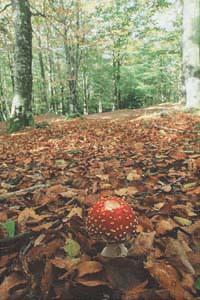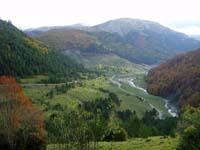Forestry route

The health benefits are multiple. (Photo: Danel Solabarrieta).
In Japan it is known as Shinrin-yoku immersion in the forest and its researchers have shown that it has a beneficial effect on health. For example, it has been observed that the blood glucose level decreases in diabetics when they move in the forest. Other researchers have seen some diseases of the respiratory system alleviate.
What does the forest have to have a healing effect? Several researchers try to answer this question and begin to analyze the molecules found in the air of the forest. Of the 120 compounds found in the forests of Sierra Nevada, California, only 70 have been identified. This means that whoever circulates through the forest does not know what he breathes. And that, where it has been investigated. What do we breathe in the forests here? Who knows it.
Volatile molecules
However, among the molecules identified are compounds released by fungi and soil bacteria. Most of them come from the trees. Specifically, volatile organic compounds are released from a kind of pocket that is found between the cells of the leaves. Many of them are called monoterpenes in chemistry.

There are several theories to explain why trees release volatile compounds. It may be released to scare insects or to treat them as collateral products of metabolism.
Volatile organic compounds affect people for one reason or another. When volatile molecules come into contact with olfactory nerves present in the nose, they send a message to the cerebral limbic system. It is the area of the brain that deals with instinctive emotions, such as sex, memory and aggression. And it is shown that the limbic system acts on the body. By smelling a volatile molecule, therefore, the entire chain is launched, although one does not realize it.
In addition, volatile molecules reach not only the nose, but also the lungs. And from there some enter into circulation. Thus, the molecules breathed when walking through the forest become part of the body.
Aromatherapy

Losing in the forest has no price. (Photo: Itziar Nogeras).
In aromatherapy, compounds of vegetable origin are called essential oils and each of them has a specific influence on the human body. For example, according to those who work in aromatherapy, pine monotypes are antivirus and antiseptic, that is, they protect from infections. In addition, they are good for relieving asthma and respiratory diseases. However, there are no scientific studies that show it.
By mouth, it has been shown that monotherms have an anticancer effect and the drugs taken in chemotherapy have monoterpenes. However, they have not yet tested with odors if they have that medicinal effect.
According to Joan Maloof, a biologist at the University of Salisbury, western medicine may not worry about studying the influence of forests, since it is not possible to obtain any economic benefit, since it is not possible to put the air from the forest in a bottle and sell it at the price of gold. However, many do not need scientific evidence to know that it is really healthy. And for the moment, losing in the forest has no price.
Published in 7K.
Buletina
Bidali zure helbide elektronikoa eta jaso asteroko buletina zure sarrera-ontzian











